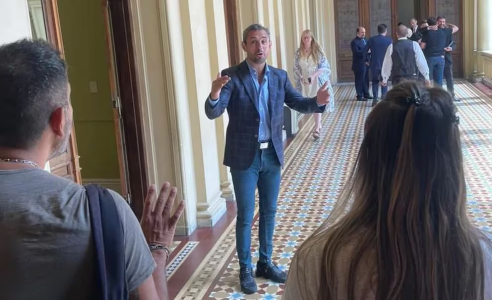The ruling party now clarified that it will accept modifications that improve the omnibus law - Infobae

Source:

 www.infobae.com
www.infobae.com
January 08, 2024
The president of the Chamber of Deputies, Martín Menem, assured that he has the power to accept changes to the project. “The north is not negotiated but suggestions are accepted,” he reported.

Martín Menem, president of the Chamber of Deputies
24 hours before the formal debate begins in the Chamber of Deputies of the ambitious omnibus bill sent by the Executive Branch, the president of the body, the ruling party Martín Menem, clarified that he was authorized to dialogue with the rest of the blocks and accept changes as long as the “north” of the norm is not altered.
“The north is not negotiated, ideas are not negotiated, but suggestions are accepted,” he said in dialogue with journalist Marcelo Longobardi on radio Rivadavia. And he developed: “I have received some suggestions that are very valuable from those who want to accompany the change and have taken note of the crisis we are going through.”
Yesterday, President Javier Milei had declared that he will not negotiate “anything” about the law, although he was open to listening to “suggestions.” Menem clarified this Monday what the limits of that opening are.
“We do not negotiate anything that puts destiny at stake, we do accept suggestions that can improve the project, which is very ambitious,” he said. Then in another section of the report he added: “Suggestions are accepted, we are here to work together without negotiating the freedom of Argentines.”
In this context he anticipated that they will take proposals from other parties that they consider can improve people's lives or that promote greater deregulation of the economy. “The most creative ideas are going to be taken and accepted,” she pointed out. And he closed: “We are going to accept improvements that at the end of the road will return freedom to Argentines.”
In summary, the ruling party seems willing to make some concessions without altering the basic core of ideas and the public discussion revolves around a discursive question about how to present the debate of ideas. The Government wants to avoid the term “negotiation” so as not to give the idea that it gave in and that is why it limits itself to communicating that it only accepts suggestions.
Tomorrow the information sessions will begin in the committees of the Chamber of Deputies. The Government intends to meet on January 25 to approve the project without extending the ordinary sessions, a goal that is difficult to achieve.
“The law is big, it is broad, it is very ambitious. When they ask me why so many articles, I answer that we have never experienced a crisis like this. We have to do things that we didn't do in the last 100 years. “There is no money,” says the President. And I add that there is no time. What we have to do to avoid collapse is very hard,” says Menem, who explained that the project seeks to free up investment income into the country to compensate for the drop in activity due to the deficit cut.
Despite the narrative of the Casa Rosada, last week there was already a negotiation and the Government ended up giving in: it was on Friday when Minister Guillermo Francos received Ignacio Torres from Chubut and promised to review the articles linked to fishing activity. Torres and other Patagonian leaders reject opening the exclusive Argentine zone to foreign companies.
The package, called Bases and Starting Points for the Freedom of the Argentines, in honor of Juan Bautista Alberdi, includes 664 articles that They repeal other laws and promote changes in public and private activity.

President Milei with Martín Menem
www.buysellba.com

Source:

El oficialismo aclaró ahora que aceptará modificaciones que mejoren la ley ómnibus
El presidente de la Cámara de Diputados, Martín Menem, aseguró que tiene la facultad de aceptar cambios en el proyecto. “No se negocia el norte pero sí se aceptan sugerencias”, informó
January 08, 2024
The president of the Chamber of Deputies, Martín Menem, assured that he has the power to accept changes to the project. “The north is not negotiated but suggestions are accepted,” he reported.

Martín Menem, president of the Chamber of Deputies
24 hours before the formal debate begins in the Chamber of Deputies of the ambitious omnibus bill sent by the Executive Branch, the president of the body, the ruling party Martín Menem, clarified that he was authorized to dialogue with the rest of the blocks and accept changes as long as the “north” of the norm is not altered.
“The north is not negotiated, ideas are not negotiated, but suggestions are accepted,” he said in dialogue with journalist Marcelo Longobardi on radio Rivadavia. And he developed: “I have received some suggestions that are very valuable from those who want to accompany the change and have taken note of the crisis we are going through.”
Yesterday, President Javier Milei had declared that he will not negotiate “anything” about the law, although he was open to listening to “suggestions.” Menem clarified this Monday what the limits of that opening are.
“We do not negotiate anything that puts destiny at stake, we do accept suggestions that can improve the project, which is very ambitious,” he said. Then in another section of the report he added: “Suggestions are accepted, we are here to work together without negotiating the freedom of Argentines.”
In this context he anticipated that they will take proposals from other parties that they consider can improve people's lives or that promote greater deregulation of the economy. “The most creative ideas are going to be taken and accepted,” she pointed out. And he closed: “We are going to accept improvements that at the end of the road will return freedom to Argentines.”
In summary, the ruling party seems willing to make some concessions without altering the basic core of ideas and the public discussion revolves around a discursive question about how to present the debate of ideas. The Government wants to avoid the term “negotiation” so as not to give the idea that it gave in and that is why it limits itself to communicating that it only accepts suggestions.
Tomorrow the information sessions will begin in the committees of the Chamber of Deputies. The Government intends to meet on January 25 to approve the project without extending the ordinary sessions, a goal that is difficult to achieve.
“The law is big, it is broad, it is very ambitious. When they ask me why so many articles, I answer that we have never experienced a crisis like this. We have to do things that we didn't do in the last 100 years. “There is no money,” says the President. And I add that there is no time. What we have to do to avoid collapse is very hard,” says Menem, who explained that the project seeks to free up investment income into the country to compensate for the drop in activity due to the deficit cut.
Despite the narrative of the Casa Rosada, last week there was already a negotiation and the Government ended up giving in: it was on Friday when Minister Guillermo Francos received Ignacio Torres from Chubut and promised to review the articles linked to fishing activity. Torres and other Patagonian leaders reject opening the exclusive Argentine zone to foreign companies.
The package, called Bases and Starting Points for the Freedom of the Argentines, in honor of Juan Bautista Alberdi, includes 664 articles that They repeal other laws and promote changes in public and private activity.

President Milei with Martín Menem
The main axes of Milei's omnibus law
- Public emergency. As a first measure, the Executive Branch seeks that Congress declare the public emergency in economic, financial, fiscal, pension, security, defense, tariff, energy, health, administrative and social matters until December 31, 2025. This will allow the Government assumes “legislative powers” in these matters.
- Privatization of public companies. The Government seeks to generate “greater competition and economic efficiency, reduce the tax burden, improve the quality of services, promote private investment and professionalize management.” In this sense, public limited companies will be established, “in which the national Executive Branch may retain a share with the right to veto in decisions that imply the closure of the activity.”
- Regulatory quality policy. The measure aims to simplify, digitalize and administratively de-bureaucratize, “promoting transparency and due administrative process, as well as alleviating burdens and costs. administrative, to obtain efficient regulations for the competitiveness of the markets, the creation of employment and everything that contributes to raising the standard of living of citizens and the consequent reduction of poverty rates.”
- Internal control of the administration. The Executive Branch “may carry out public credit operations to restructure the public debt and the guarantees granted in the terms of articles 62 and 64, through its consolidation, conversion or renegotiation, taking into account the prevailing conditions of the financial market.”
- Political activity and public function. The publicity of the events, programs, works, services and campaigns, and the institutional spaces of public bodies must be educational, informative or socially oriented, and cannot include names, texts, symbols or images for purposes or that involve political, party or personal promotion.
- Economic reorganization. Among the measures, the resale of sports tickets is allowed. There will be “no limit to the number of times said operation can be carried out.”
- Bioeconomy. The National Executive Branch will regulate, throughout the country, the authorization and operation regime of establishments where animals are slaughtered, or products of animal origin are manufactured or stored. This regime will include the construction and sanitary engineering requirements, the hygienic, sanitary and environmental aspects of the production, industrialization and transportation of meats, products, by-products and derivatives of animal origin intended for consumption in any part of the country's territory or for export.
- Security and Defense. “Whoever, without creating a situation of common danger, prevents, hinders or hinders the normal functioning of transportation by land, water or air or public services of communication, water provision, of electricity or energetic substances, will be punished with imprisonment of one to three years and six months,” the project establishes.
- Trials by jury. The measure requests that the Jury Trial Regime be approved at the federal level.
- Electoral system. The political reform will include the elimination of the PASO, the establishment of a new system of electing deputies based on single-member constituencies and modifying closed lists.
- Childhood and family. They seek to “strengthen comprehensive health care for mothers in vulnerable situations and for children from the moment of conception until they are three years old; in order to reduce maternal and child morbidity and mortality, malnutrition and malnutrition, the protection and stimulation of early bonds, and physical and emotional development.”
- Education. They propose an examination for all students at the end of secondary school, the dissemination of the results of standardized assessments by school and greater teacher evaluation , among other changes in the educational system. It also enables university tuition for foreigners who do not have permanent residence.
- On the other hand, the Government also seeks eliminate the current formula for updating retirements and pensions, assuming the power to “carry out periodic increases, giving priority to the lowest-income beneficiaries.” It is not detailed how often the increases will be or what indicators will be taken as a reference.
- One of the points that caught the attention of the opposition deputies was the inclusion, almost at the end of the project, of an article that “ratifies” the mega decree of necessity and urgency No. 70, which will also be addressed in the bicameral commission of Legislative Procedure.
www.buysellba.com

